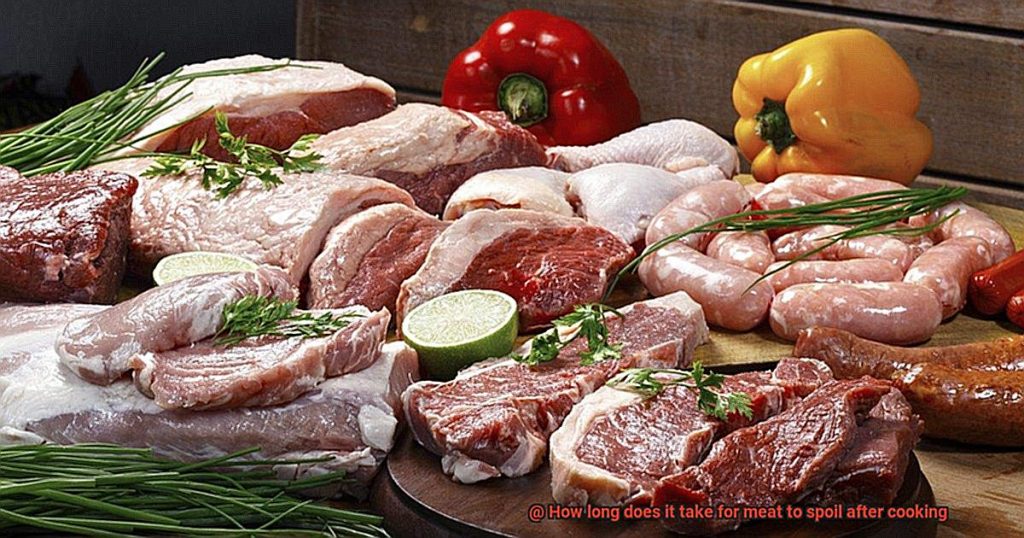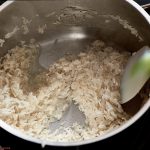Calling all meat enthusiasts. Have you ever pondered over the lifespan of cooked meat before it turns bad? We are all aware that raw meat needs to be kept refrigerated and cooked thoroughly to prevent food poisoning. But what about leftovers? How long can you keep them in the fridge before they go off?
Once your meat is cooked, the clock starts ticking. The duration for which it will remain fresh depends on various factors like the type of meat, cooking method, and storage techniques. It’s crucial to understand these elements to avoid getting sick and wasting food.
In this intriguing post, we’ll delve deeper into the world of cooked meat and answer one of the most frequently asked questions: How long does it take for meat to spoil after cooking? We’ll explore the science behind spoilage and share tips on identifying if your cooked meat has gone bad. Additionally, we’ll provide you with handy tricks on how to store your leftovers effectively, extending their shelf life while preventing food wastage.
So let’s get cooking (and storing) and ensure that our beloved meats stay delectable and safe for consumption as long as possible.
Contents
What is the General Rule of Thumb for Storing Cooked Meat?
The general rule of thumb is straightforward: cooked meat should be refrigerated within two hours of cooking to prevent bacterial growth that can lead to foodborne illnesses. However, there are several other factors that can affect how long cooked meat remains safe to eat.
The type of meat plays a significant role in spoilage rate. Beef and lamb, with their lower water content and higher fat content, tend to last longer than poultry or fish. Poultry and fish have a higher water content and lower fat content, making them more vulnerable to bacterial growth.
Storage conditions also affect the shelf life of cooked meat. It’s vital to store cooked meat in an airtight container or wrap it tightly with plastic wrap or aluminum foil to prevent air from getting in and causing oxidation, which can accelerate spoilage. Additionally, the meat should be stored in the coldest part of the refrigerator (below 40°F) or freezer (below 0°F). When storing cooked meat in the refrigerator, keep it on the bottom shelf to prevent juices from contaminating other foods.
It’s essential to note that cooked meat should not be stored for longer than four days in the refrigerator or three months in the freezer. Freezing can affect the texture and quality of the meat; therefore, it is best to consume it within a reasonable timeframe.
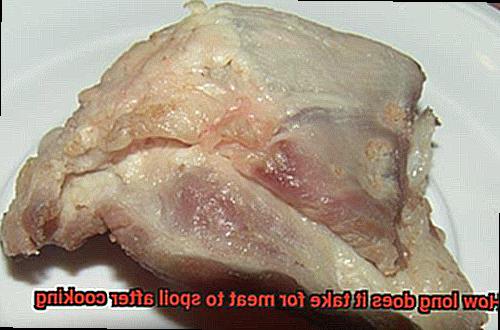
Lastly, the cooking method can also affect how long cooked meat lasts before spoiling. High-temperature cooking methods such as grilling or broiling can cause the meat to dry out, making it more susceptible to bacterial growth. On the other hand, slower cooking methods like slow-cooking or braising tend to have a longer shelf life.
In summary, proper storage and handling of cooked meat are crucial for food safety. To ensure that your cooked meat remains safe and enjoyable to eat, follow these guidelines:
- Refrigerate cooked meat within two hours of cooking
- Store the meat in an airtight container or wrap it tightly with plastic wrap or aluminum foil
- Store the meat in the coldest part of the refrigerator or freezer
- Keep cooked meat on the bottom shelf to prevent contamination
- Consume within three to four days and freeze for up to three months maximum.
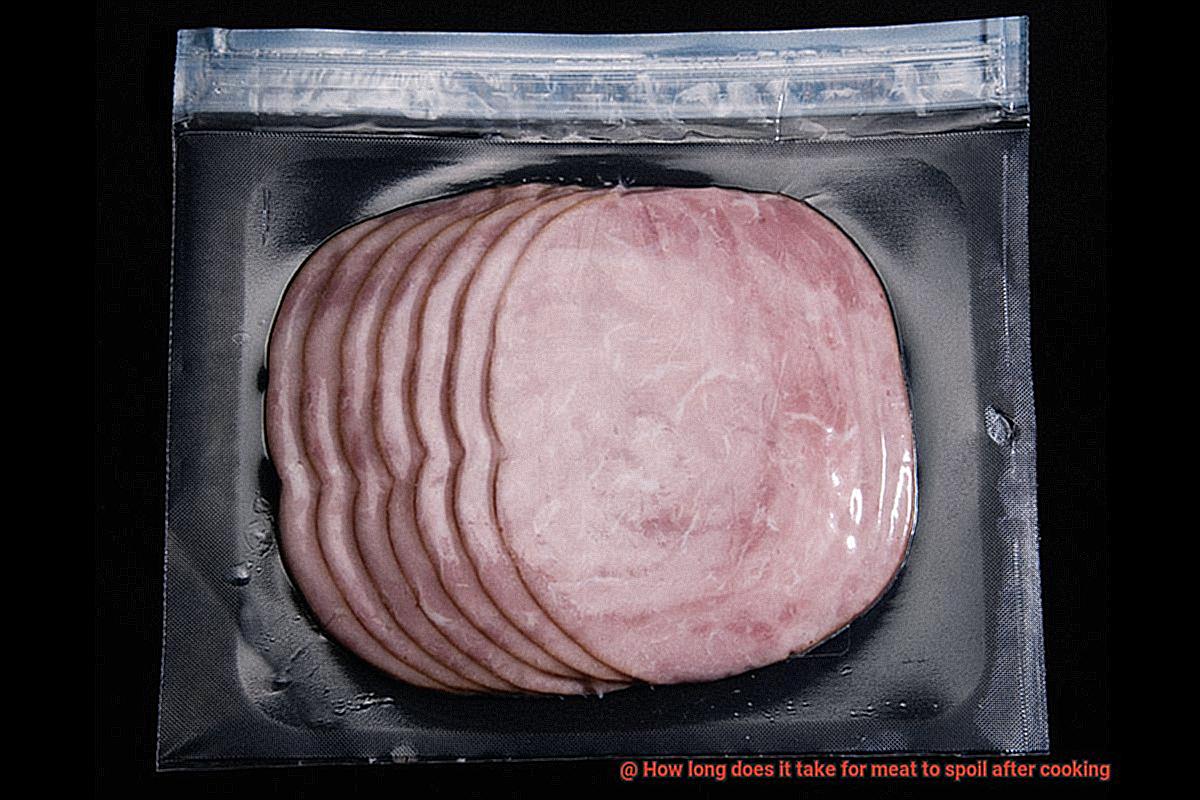
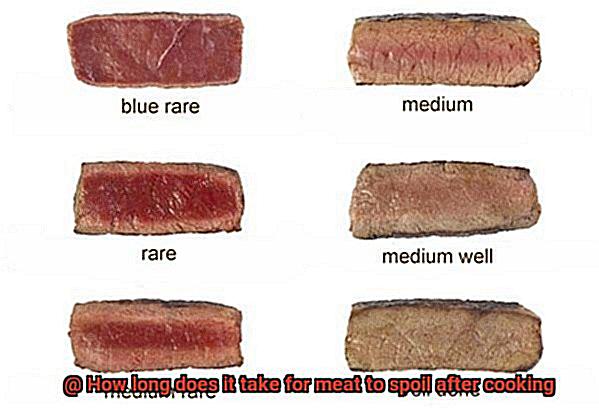
How Does the Type of Meat Affect Spoilage?
As a self-proclaimed foodie, there’s nothing quite like sinking your teeth into a juicy and flavorful piece of meat. Whether it’s a perfectly cooked steak or a succulent piece of chicken, meat can be the centerpiece of any delicious meal. However, it’s important to remember that meat can quickly turn into a food safety nightmare if not handled correctly.
One critical factor that can affect the spoilage of meat is the type of meat itself. Different types of meat have different levels of moisture and fat content, which can impact how quickly they spoil. Let’s take a closer look at how the type of meat affects spoilage.
Red meat like beef or lamb has a higher fat content than leaner meats like chicken or fish. While the fat in these meats can provide a breeding ground for bacteria, their lower moisture content means they tend to spoil more slowly than other meats. This is why you’ll often find red meat still edible after a few days in the fridge.
On the other hand, chicken and fish have much higher moisture content than red meat, providing an ideal environment for bacteria to grow. This means that chicken and fish tend to spoil faster than other meats. In fact, fish is highly perishable and can begin to spoil within hours of being caught.
It’s also important to keep in mind that processed meats like sausage or deli meat can be more susceptible to spoilage due to the additives and preservatives used in their production. These additives can break down over time, reducing their effectiveness at preventing spoilage. So if you’re buying processed meats, make sure to check the expiration date and consume them before they expire.
So what does this all mean for you? Well, it’s crucial to handle and store all types of meat properly to prevent bacterial growth and ensure its safety for consumption. Here are some tips to keep in mind:
- Refrigerate cooked meat within two hours of cooking.
- Store it in an airtight container or wrap.
- Keep it in the coldest part of the refrigerator or freezer.
- Consume it within three to four days, and freeze for up to three months maximum.
What Are the Ideal Storage Conditions for Cooked Meat?
First and foremost, proper heating is essential. The USDA recommends reheating cooked meat to an internal temperature of 165°F (74°C) before consumption. This ensures that any harmful bacteria lurking in the meat are destroyed.
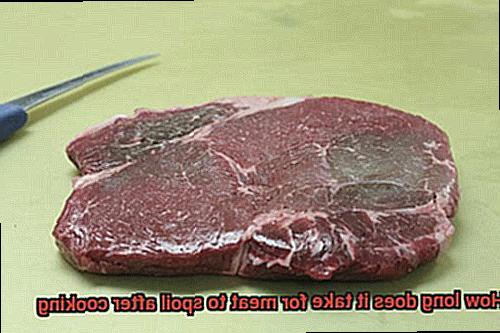
Once your meat has been cooked and heated, it should be stored in an airtight container or wrapped tightly with aluminum foil or plastic wrap. This prevents the meat from drying out and becoming tough. It’s important to remember that cooked meat should never be left at room temperature for more than two hours. If the temperature exceeds 90°F (32°C), reduce this time limit to an hour. Any leftover meat that has been sitting at room temperature for longer than this should be discarded immediately.
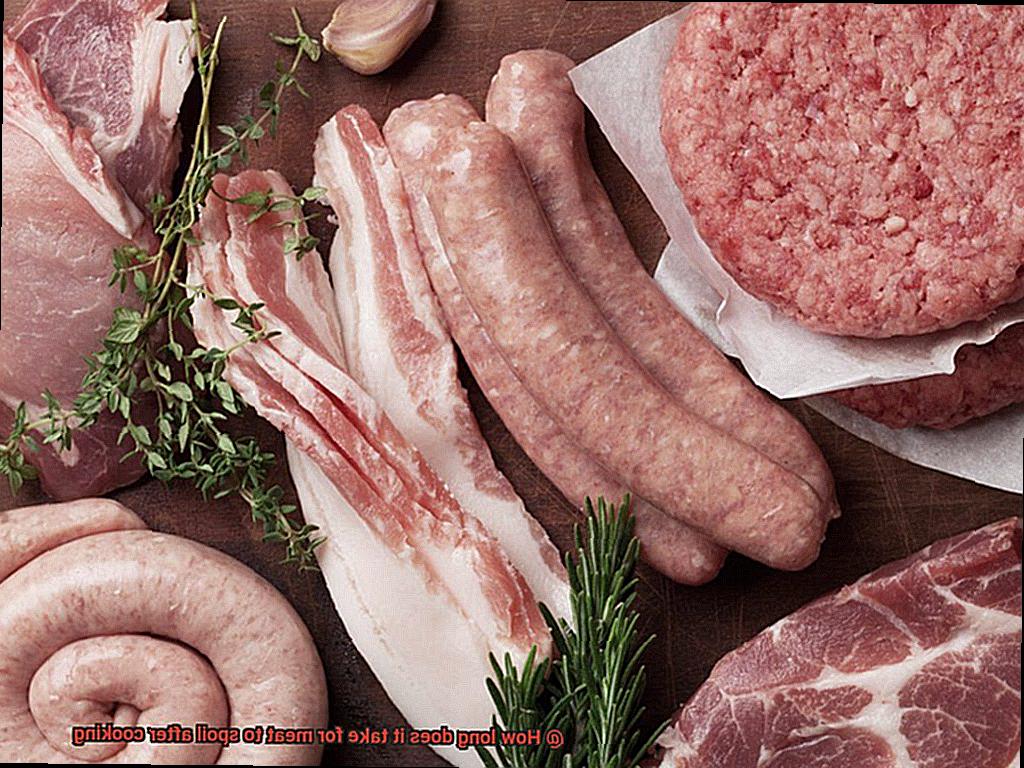
When it comes to refrigeration, cooked meat should be kept at 40°F (4°C) or below. To achieve this, store the meat on a shelf in the main compartment of the refrigerator, as opposed to the door where temperatures can fluctuate more easily. Cooked meat can be safely stored in the refrigerator for up to four days.
If you need to store cooked meat for longer than four days, freezing is your best option. Cooked meat can be frozen for up to three months without any significant loss in quality. Simply wrap it tightly in freezer paper or aluminum foil and place it in a freezer-safe container or plastic bag. Be sure to label the container or bag with the date so that you can keep track of how long it has been frozen.
How Long Can Cooked Meat Be Stored in the Refrigerator or Freezer?
Food safety is paramount when it comes to storing cooked meat. Whether you’re a seasoned chef or a home cook, knowing how long cooked meat can be stored in the refrigerator or freezer is crucial. So, let’s explore this topic in depth and ensure that our cooked meat stays fresh and delicious.
Generally speaking, cooked meat can be stored in the refrigerator for up to four days. However, this timeframe may vary depending on the type of meat and how it has been prepared. For instance, cooked chicken and turkey should be consumed within three to four days, while cooked beef and pork can last up to five days.
To ensure that your cooked meat stays fresh for as long as possible, proper storage techniques are critical. This means keeping it in airtight containers or wrapping it tightly with plastic wrap or aluminum foil. If you want to extend the shelf life of your cooked meat even further, you can store it in the freezer.
When stored correctly, cooked meat can last for several months in the freezer. To prevent freezer burn and maintain its freshness, use freezer-safe airtight containers or heavy-duty freezer bags. And remember – when reheating your cooked meat, make sure it reaches an internal temperature of 165°F (74°C) to kill any potential bacteria that may have grown during storage.
Leaving cooked meat at room temperature for more than two hours can increase the risk of bacterial growth and spoilage. Therefore, always ensure that you’re storing and reheating your food properly to keep yourself and your loved ones safe from foodborne illnesses.
In summary, here are some key takeaways:
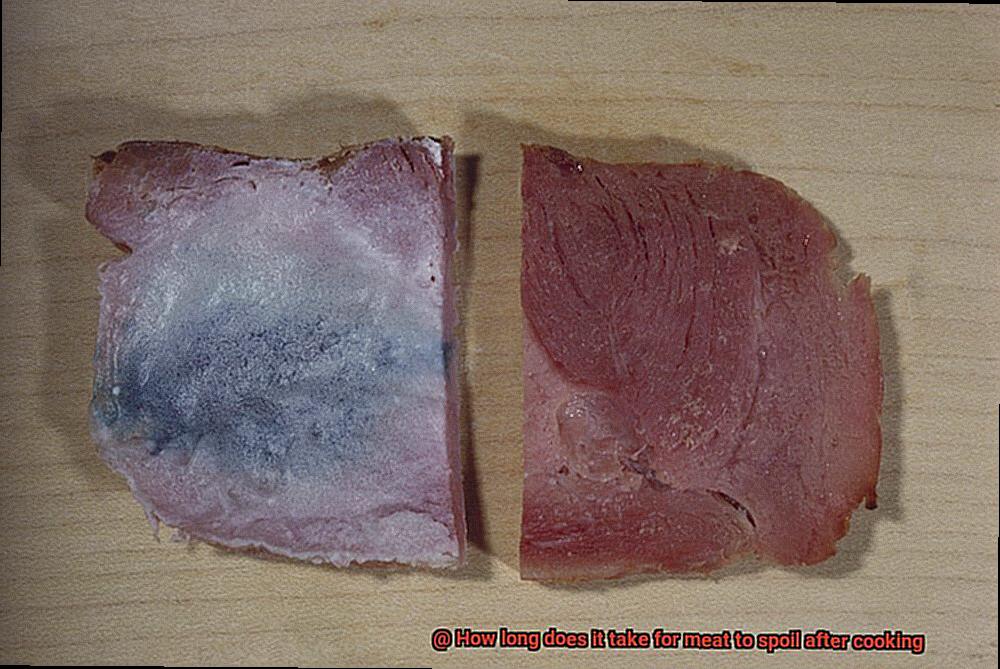
- Cooked meat can be stored in the refrigerator for up to four days.
- Cooked chicken and turkey should be consumed within three to four days, while cooked beef and pork can last up to five days.
- Proper storage techniques are critical – use airtight containers or wrap your cooked meat tightly with plastic wrap or aluminum foil.
- Cooked meat can last for several months in the freezer, provided it is stored correctly.
- When reheating cooked meat, ensure it reaches an internal temperature of 165°F (74°C) to kill any potential bacteria.
- Avoid leaving cooked meat at room temperature for more than two hours.
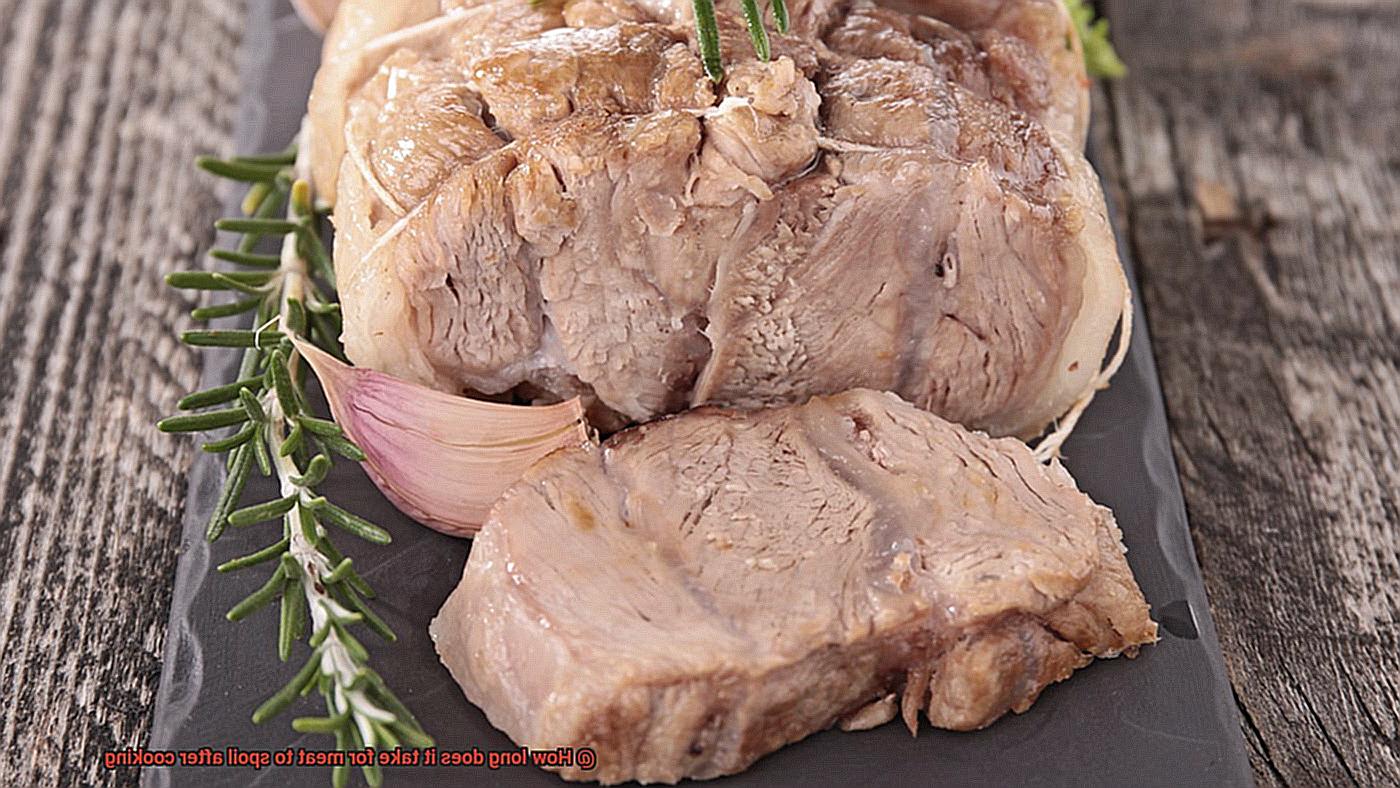
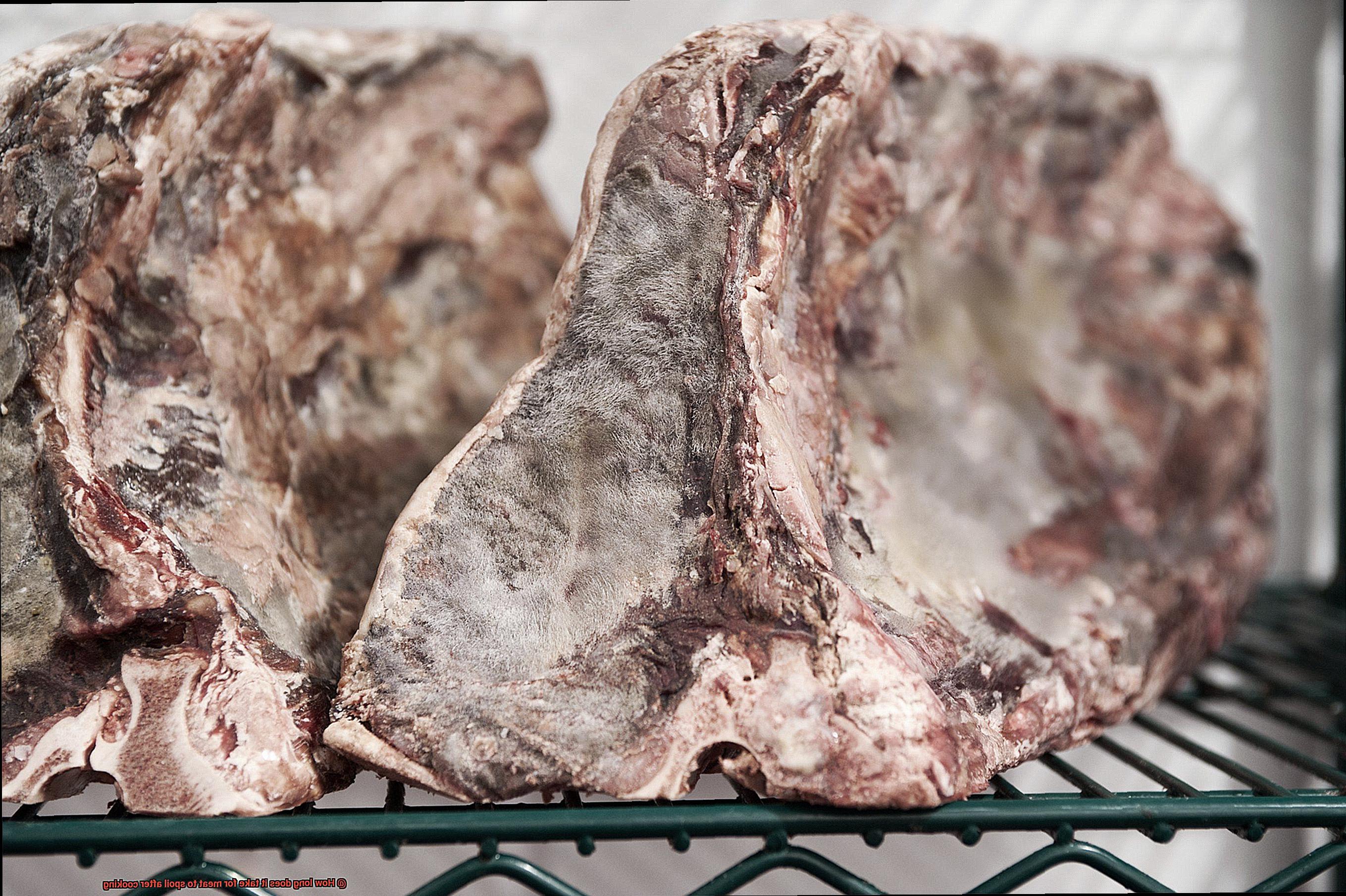
What Is the Effect of Cooking Method on Shelf Life?
So, let’s dive into the details.
First off, grilling is a popular cooking method that involves exposing meat to high heat for a short period. While it can result in a seared exterior and tender interior, it may not kill all the bacteria present in the meat. As a result, grilled meat has a shorter shelf life compared to other cooking methods.
On the other hand, roasting is another popular method that involves cooking meat in an oven at high temperatures for an extended period until it’s fully cooked. Roasting is known to kill most bacteria in the meat, including those that are deep inside. As such, roasted meat has a longer shelf life than grilled meat.
But wait, there’s more. Boiling and simmering are also common cooking methods that involve cooking meat in water. Both methods are known to kill most bacteria in the meat and increase its shelf life. Boiling involves cooking meat at high temperatures until it’s fully cooked, while simmering involves cooking it at lower temperatures for an extended period.
To summarize, different cooking methods have varying effects on the shelf life of meat. While grilling may result in a shorter shelf life due to its inability to penetrate deep into the meat, roasting, boiling, and simmering are known to kill most bacteria and increase the shelf life of meat. So, be mindful of your cooking method when choosing how to prepare your protein.
However, even if you cook your meat using one of these methods, proper storage techniques are crucial for extending its shelf life. Remember to store cooked meat in an airtight container or wrap it tightly with plastic wrap or aluminum foil before putting it in the fridge or freezer. Leaving it at room temperature for more than two hours can increase the risk of bacterial growth and spoilage.
How to Tell If Cooked Meat Has Spoiled
Cooked meat is a tasty and nutritious source of protein that can be enjoyed in various dishes. However, if cooked meat is not handled carefully and stored properly, it can spoil and become unsafe to eat. To avoid the health risks associated with eating spoiled food, it is essential to know how to tell if cooked meat has spoiled. Here are five sub-sections that can help you determine whether your cooked meat has gone bad or not.
Check the Color and Texture
One of the easiest ways to tell if cooked meat has spoiled is by checking its color and texture. Cooked meat should have a brown or slightly pink color. If it appears gray or brown, it could be a sign that it has gone bad. Moreover, if the texture of the meat feels slimy or sticky, it’s best to throw it out. These are indications that bacteria have started growing on the meat.
Smell It
Another way to tell if cooked meat has spoiled is by smelling it. Spoiled meat usually has a strong, unpleasant odor. If your cooked meat smells sour or rancid, this could be an indication that it has spoiled. Trust your sense of smell and throw out any cooked meat that doesn’t smell right.
Check for Mold
Mold is a sign that bacteria have been growing on the surface of the meat, making it unsafe to eat. If you notice any mold on the surface of the cooked meat, it is likely spoiled and should be discarded immediately.
Use a Food Thermometer
If you are uncertain whether the cooked meat is still safe to eat, use a food thermometer to check its internal temperature. Cooked meat should be stored at a temperature below 40°F (4°C) to prevent bacterial growth. If the internal temperature of the meat is above this range, it’s best to dispose of it.
Trust Your Instincts
If you have any doubts about the safety of the cooked meat, it’s best to err on the side of caution and throw it away. Eating spoiled meat can cause food poisoning and other health problems. It’s always better to be safe than sorry.
Tips for Safely Handling and Storing Cooked Meat
Here are five tips to help you out.
Firstly, wash your hands thoroughly with soap and warm water before and after handling any type of meat. This simple step can prevent the spread of harmful bacteria that can cause foodborne illness.
Next, store cooked meat in the refrigerator or freezer as soon as possible after cooking. Leaving cooked meat out at room temperature for more than two hours, or one hour if the temperature is above 90°F (32°C), can allow bacteria to grow and cause the meat to spoil. When storing cooked meat in the refrigerator, make sure it is stored in an airtight container or wrapped tightly in plastic wrap or aluminum foil. Label the container with the date that the meat was cooked so that you can keep track of how long it has been stored. Cooked meat typically stays safe in the refrigerator for 3-4 days.
If you want to store cooked meat for longer periods of time, freeze it. Wrap it tightly in plastic wrap or aluminum foil, or place it in an airtight container before freezing. Cooked meat can be safely stored in the freezer for up to 6 months.
When reheating cooked meat, make sure it reaches an internal temperature of 165°F (74°C) to ensure that any bacteria present are killed off. Cutting large pieces of meat into smaller portions before reheating helps ensure that they heat evenly.
Lastly, when handling cooked meat, always use clean utensils and surfaces to prevent cross-contamination with raw meats or other foods. This is especially important if you are using the same cutting board and knife for both raw and cooked meats.
5wHTmACN2n4″ >
Conclusion
In conclusion, the longevity of cooked meat is influenced by a variety of factors, including the type of meat, cooking method, and storage techniques. Proper handling and storage are essential to avoid foodborne illnesses and prevent waste. Remember that cooked meat should be refrigerated within two hours of cooking to prevent bacteria from multiplying.
The spoilage rate of different meats varies significantly due to their water and fat content. Beef and lamb have a longer shelf life than poultry or fish due to their lower water content and higher fat content. To maximize the shelf life of cooked meat, store it in an airtight container or wrap it tightly with plastic wrap or aluminum foil while keeping it in the coldest part of the refrigerator (below 40°F) or freezer (below 0°F).
Different cooking methods also affect the shelf life of meat. Roasting, boiling, and simmering kill most bacteria and can extend the shelf life compared to grilling. You can tell if cooked meat has spoiled by checking its color and texture, smelling for any unpleasant odor, looking for mold, using a food thermometer, and trusting your instincts.
By following these tips for safely handling and storing cooked meat like a pro, you can ensure that your meals remain delicious while preventing food wastage.

